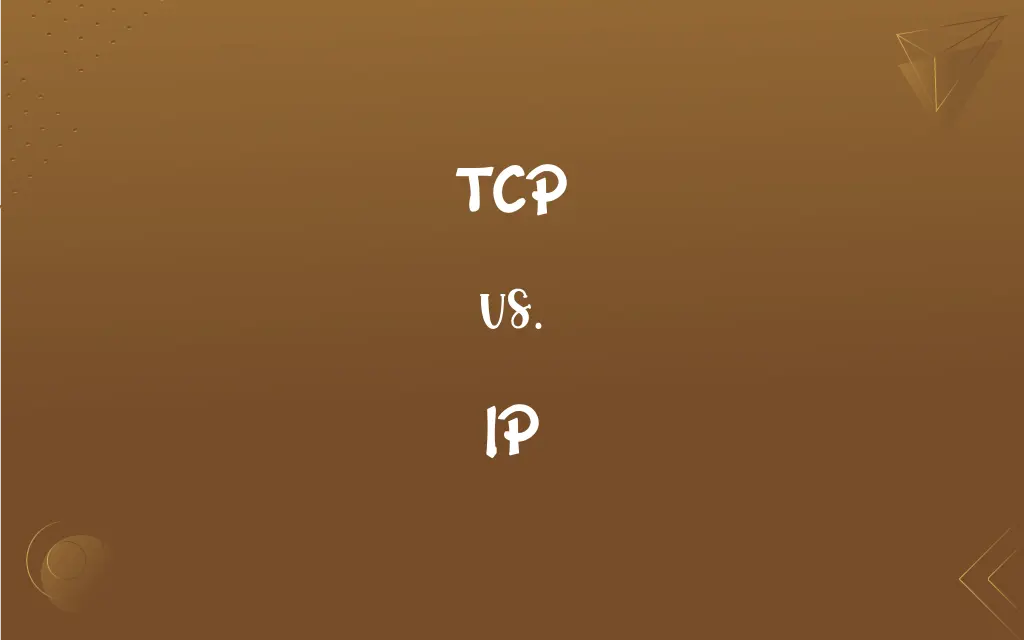TCP vs. IP: What's the Difference?
Edited by Aimie Carlson || By Harlon Moss || Published on February 19, 2024
TC (Transmission Control) refers to methods for reliable data transmission in networking, while IP (Internet Protocol) defines rules for addressing and routing data packets across networks.

Key Differences
Transmission Control (TC) is a concept primarily concerned with the reliable delivery of data over a network. It involves ensuring data integrity, controlling the flow, and error checking. Internet Protocol (IP), on the other hand, is a set of rules that governs the format of data sent over the internet or local network.
TC is often associated with TCP (Transmission Control Protocol), a key protocol for maintaining a reliable connection and ensuring that data packets arrive accurately and in sequence. IP is more about addressing and routing; it assigns unique addresses (IP addresses) to devices and determines the best path for data to travel across networks.
The focus of TC is on the end-to-end transmission of data packets, including aspects like packet order, data integrity, and congestion control. IP’s role is in the encapsulation and addressing of packets, enabling them to be sent from a source to a destination over interconnected networks.
TC mechanisms are crucial in applications where reliability is paramount, like file transfers, emails, and secure communications. IP is fundamental for all types of networked communications, providing the basic layer for addressing and routing data packets in a standardized format.
TC works closely with other protocols (like TCP) to provide a seamless and error-free communication experience. IP, while working with protocols like TCP and UDP, primarily handles the task of delivering packets to the correct destination based on IP addresses.
ADVERTISEMENT
Comparison Chart
Primary Function
Ensures reliable data transmission
Governs addressing and routing of data packets
Associated Protocol
Often linked with TCP
Core part of the TCP/IP suite
Key Focus
Data integrity, order, and flow control
Packet addressing and network path determination
Usage in Communications
Essential for reliable, error-free data transfer
Fundamental for all network communications
Role in Networking
Manages end-to-end data packet delivery
Provides the basic layer for network addressing
ADVERTISEMENT
TCP and IP Definitions
TCP
Works with TCP in the internet protocol suite.
TC, as part of TCP, ensures the integrity of data in emails.
IP
Defines rules for routing and addressing data packets.
The IP address was used to route the email to the correct server.
TCP
Involves error checking and correction in data transmission.
TC detected a corrupt packet and requested a retransmission.
IP
Fundamental for internet and network communications.
IP ensures that my web requests reach the right destination.
TCP
Manages flow control to prevent network congestion.
TC adjusted the data sending rate to avoid overwhelming the receiver.
IP
Assigns unique addresses to devices on a network.
My computer's IP address identifies it on the internet.
TCP
Vital for applications requiring high reliability.
Secure financial transactions rely on TC for error-free data transfer.
IP
Works with TCP for seamless internet data transfer.
IP, combined with TCP, handles both addressing and reliable delivery.
TCP
Ensures reliable and ordered delivery of data packets.
TC mechanisms corrected the lost packets during the file transfer.
IP
Encapsulates data packets for transmission across networks.
The IP protocol encapsulated my message for sending over the network.
TCP
A protocol developed for the internet to get data from one network device to another;
TCP uses a retransmission strategy to insure that data will not be lost in transmission
IP
The sciences concerned with gathering and manipulating and storing and retrieving and classifying recorded information
FAQs
How does TC handle lost data?
It detects and requests retransmission of lost packets.
Why is TC important in internet communication?
It ensures reliability and integrity in data transmission.
Can IP addresses change?
Yes, they can be static or dynamic.
What is the primary role of IP?
Addressing and routing data packets in networks.
Do TC and IP work together?
Yes, in the TCP/IP protocol suite for internet communication.
Is TC responsible for data packet order?
Yes, it ensures packets are received in sequence.
Can TC work independently of TCP?
No, it's typically part of TCP in networking.
Is IP used for both internet and local networks?
Yes, it operates in all types of networks.
How does IP impact internet browsing?
It routes user requests to the correct web servers.
Is IP involved in direct data transmission?
No, it deals with addressing and routing, not the actual transfer.
What does TC stand for in networking?
Transmission Control.
How does IP identify devices?
Through unique IP addresses.
Can TC adjust data transmission based on network conditions?
Yes, it adapts to network congestion and bandwidth.
Are IP addresses unique worldwide?
Yes, each IP address is unique in the context of its network.
Can IP address allocation be manual or automatic?
Yes, it can be either static (manual) or dynamic (automatic).
How does IP handle mobile devices?
Mobile devices receive dynamic IP addresses for network access.
Is TC visible to end-users?
No, it operates behind the scenes in data transmission.
Does TC control data flow speed?
Yes, it manages flow to prevent congestion.
What is the difference between IPv4 and IPv6?
IPv6 allows for more addresses due to its longer format.
What happens if TC detects an error?
It requests retransmission of erroneous data.
About Author
Written by
Harlon MossHarlon is a seasoned quality moderator and accomplished content writer for Difference Wiki. An alumnus of the prestigious University of California, he earned his degree in Computer Science. Leveraging his academic background, Harlon brings a meticulous and informed perspective to his work, ensuring content accuracy and excellence.
Edited by
Aimie CarlsonAimie Carlson, holding a master's degree in English literature, is a fervent English language enthusiast. She lends her writing talents to Difference Wiki, a prominent website that specializes in comparisons, offering readers insightful analyses that both captivate and inform.































































